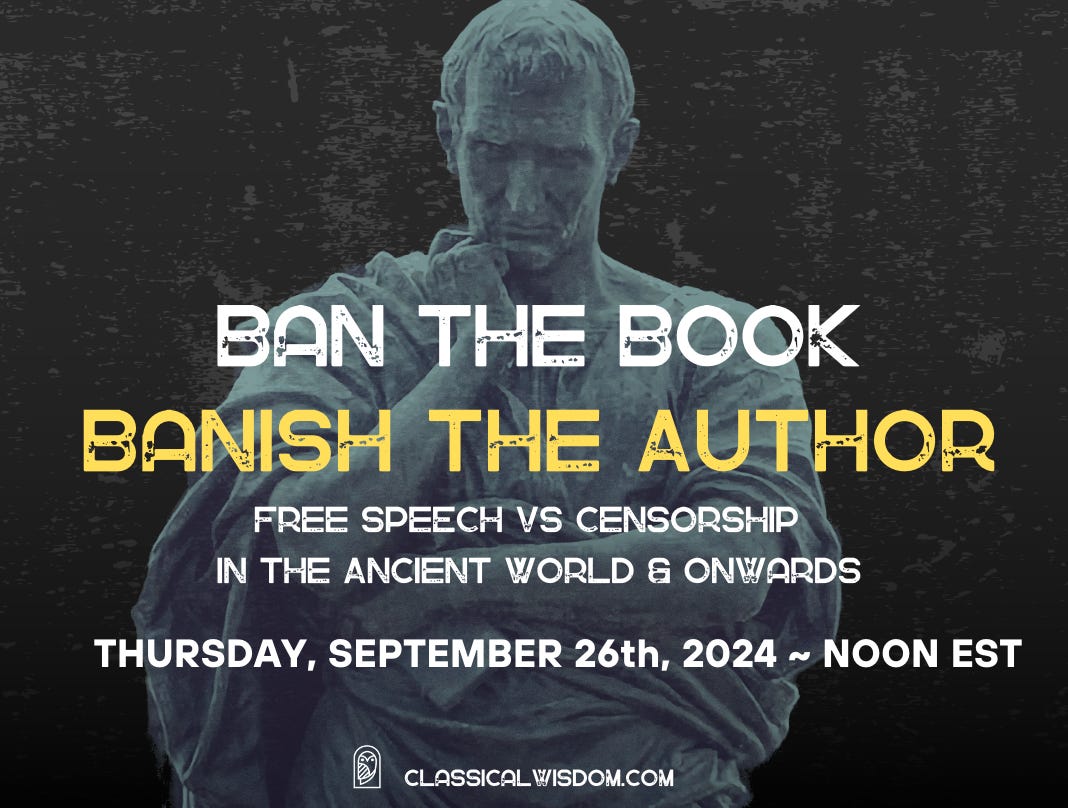Should Drugs be Criminalized?
Do mind and mood alternating substances help, harm or inspire?
Dear Classical Wisdom Reader,
At times it has worked and other times...not so much. But always, it’s been controversial.
I’m talking about the decriminalization of drugs. The sociologist in me knows that some form of intoxication, whether it calms or energizes, subdues or subverts, exists in every society. A powerful social cohesive, essential aids in medicine or a way to escape the difficulties of life, drugs have played an important part in history.
The ancients were no exception. From the highest emperors to the lowly farmhands, there is plentiful evidence of both recreational and medicinal drug use. Indeed, one could argue that many of the more inspired contributions in the ancient world were the product of an altered state of mind.
One only has to think of the loosen tongues in Plato’s Symposium or the cryptic hallucinations of the Pythias at the Oracle of Delphi, to acknowledge how fundamental substances were to the ancients... and that’s not even discussing the innumerable festivals and religious rites which included no end of stimulating herbs, drinks, or fumes.
Now was this practice confined to the Greeks or Romans, either! Herodotus describes how their eastern nomadic friends made hay in their own way:
“The Scythians thereafter take seeds from the hemp and throw them on red-hot stones, where [they smoulder] and give off fumes,” writes Herodotus. “They cover this with mats and crawl under while fumes emerge so densely that no Greek steam bath could produce more. The Scythians howl with joy at their vapour bath.”
There were plenty of instances, too, when substances provided much sought after relief in hard times...
How did an opioid reliance affect Marcus Aurelius? What about the relief provided by a calming herb or drink for the patients of Hippocrates or Galen? Or the sleep deprived Romans who used an opium-based drink called ‘cretic wine’ to lull them to peaceful dreams?
Even Helen of Troy (according to Homer) mixed her wine with a drug,
“that took away painful memories and the bite of pain and anger. Those who took this drug dissolved in wine could not shed a tear even at the death of a parent. Indeed not even if his brother or son were put to the sword before his eyes”.
But we all know that excessive drug use can have extremely damaging effects on both the individual and the community. You don’t need to walk around downtown San Francisco to know that... so the question becomes, how should we treat drug use?
Modern examples shed even more nuance on the case (as well as illustrate that this is a discussion of the utmost importance in many places around the world). Different attempts to address the situation have produced wildly varied results over the last few decades.
Take Portugal, for example. Having passed a decriminalization bill in 2001, illegal drug use among Portuguese teenagers declined after 2001, and 45 percent of the country's heroin addicts sought medical treatment. Moreover, HIV transmission rates via syringes plummeted and, from 2000 to 2008, prison populations fell by 16.5 percent. But the story didn’t end there. Over time, new stats, including 12-year highs in overdose rates and huge crime spikes, have the Portuguese re-examining their drug laws.
Meanwhile over in the US, National Institutes of Health statistics – like 85 percent of the U.S. prison population having active substance use disorders… or overdose deaths topping 100,000 in both 2021 and 2022 – illustrate just how grim the situation has become. While fortunately some of these numbers have recently improved, their sheer shock has made even the most liberal of locations in the US reconsider their approach.
Indeed, overdoses this year in Portland, the state’s largest city, have surged 46 percent... news that has Oregon lawmakers questioning whether their decriminalization approach in 2021 is really as effective as they’d hoped.
But perhaps the hardest fact for many living in decriminalized drug areas is how usage becomes so normalized. Seen everyday and without question, hard drug consumption with syringes and pipes and all the effects one expects from such an activity, become part of the regular backdrop... not exactly the scene one wishes to raise kids, for instance.
Like most controversial subjects, the story is complicated and multi-faceted. For example, a rise in micro-dosing and a renewed look at how many substances -legal or otherwise- can have helpful effects in addressing mental illness or hacking greater potential, could contribute both to the well being of the individual as well as the creative output of the society, just as they did at times in the ancient world.
It’s a reminder, once more, that people throughout time and place have turned to mind and mood alternating drugs to help, harm or inspire...
So where does that leave us? What should our relationship to drugs be, if any? Should they be legal? And if so, which ones…and who gets to decide?
Comment below to join in the continued conversation, with philosophy, history and critical thinking as our tools...
All the best,
Anya Leonard
Founder and Director
Classical Wisdom
P.S. Speaking of Banned substances, it’s been an interesting experiment in the build up to our event on Thursday... mostly because of just how hard it is to get the message out there... Apparently promoting a Free Speech Event is much harder than it looks.
Is even information itself on the chopping block when it comes to what we are ‘allowed’ to consume?
Make sure to register to join us on Thursday, September 26th at Noon EST… even if you can’t join us live! We’ll send a recording afterwards.
Also, please help us by sharing this event so we can get the word out! After all, as Armand D'Angour, one of our event’s keynote speakers, reminds us:
“A society where speech is curtailed in the name of stability and truth comes at a potentially greater cost.”







The best book I know on this topic is "Our Right to Drugs: The Case for a Free Market," by the late, great Dr. Thomas Szasz. Szasz was a psychiatrist who knew the full range of classical sources better than many classicists today, and he was an utterly fearless thinker. He writes there from a libertarian perspective, which sounds great for the individual...but never seems to know what to do about the individual's kids. Still, he is extremely clear eyed about the bogus distinction between "drugs" and "medicine," the latter being merely drugs that have been baptized by the state. Fifty years later it's as good as ever. (FWIW Szasz himself thought this was the best book he'd ever written, and that's saying something!) https://press.syr.edu/supressbooks/1555/our-right-to-drugs/
I think there is a difference between naturally forming hallucinogenics and medicinal plants that have been used for eons for healing vs some of the synthetic waste product from extraction. Farmakos in greek has roots in being mind controlling with intention to deceive or poison. The term drug has been a catch all but the processing, strength and taking it away from it's natural form has it's effects. Cool article :)